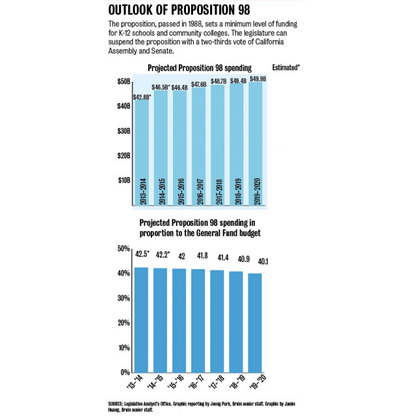Mandatory K-14 funding under Prop. 98 affects state spending on UC
State funding for the University of California has been falling for decades, in part due to a law that requires the state to give more than a third of its general funds to K-12 schools and community colleges.
Proposition 98, passed in 1988 and amended by Proposition 111 two years later, established a minimum state funding requirement for K-12 schools and community colleges. The amount has hovered between 35 to 47 percent of state general fund revenues.
Some experts said criticism of the law is resurfacing as Proposition 98 funding grows with the state’s budget surplus while the UC passes a tuition increase plan to offset state disinvestment.
The California Teachers Association sponsored Proposition 98 in an effort to stabilize and protect funding for schools, after numerous changes in property tax laws in the 1970s and 1980s, said Frank Wells, spokesperson for the association.
“Overall, (Proposition 98) has really stabilized funding for the K-12 schools and protected schools from getting shorted during recessions,” Wells said.
Daniel Mitchell, professor emeritus at the UCLA Luskin School of Public Affairs and the Anderson School of Management who studies California policy, said he thinks the law restricts the flexibility of the state to decide how to allocate funding.
“Anything that just sets aside money for some item by formula takes away the ability of the legislation to make decisions about allocation, and may mean that there won’t be enough money to go around,” Mitchell said.
Funding for K-12 schools and community colleges has traditionally come from a combination of state general funds and local property tax revenues.
After Proposition 13, which capped property tax, passed in 1978, the amount of property tax revenues for schools fell drastically, shifting the major funding burden onto the state, according to a Public Policy Institute of California report.
“(Proposition 13) really strangled the tax revenue coming to schools and shifted the vast majority of the funding burden to the state,” Wells said.
Nathan Brostrom, chief financial officer of the UC, said he thinks Proposition 98 led to a drastic shift of state higher education funding from the UC and California State University to community colleges.
“When voters approved (Proposition 98), they essentially put schools and community colleges at the top of the state’s list, but there are always other priorities, including the UC,” said Kenneth Kapphahn, an analyst at the Legislative Analyst’s Office.
With Proposition 98, funding for community colleges becomes mandatory, unlike that for the UC and CSU, which come under the state’s discretionary, or non-specific, funding category.
“Because we’re under discretionary funding, when the economy enters a recession, the UC and CSU get shunted out,” Brostrom said.
In the 1985-1986 fiscal year, the state allocated 36 percent of its higher education funding to the UC and 26 percent to community colleges. But in 2014-2015, the UC received 24 percent of state’s higher education funding while community colleges received 34 percent, according to data from the Department of Finance.
During bad economic times, Proposition 111 allows the state to provide less funding than required by the law and pay it back later. In recent years, as the state economy recovers and the budget goes into surplus, funding for the measure has increased faster than growth in the economy, said Paul Warren, analyst at the Public Policy Institute of California.
Wells said he thinks the problem is insufficient state revenue to fund all programs adequately, instead of a zero-sum game between budget items.
“Impacting other programs is a tough argument to make when you’re sitting at the bottom in terms of school funding, with some of the biggest class sizes in the nation,” Wells said.
Though there have been several efforts to repeal or amend Proposition 98 over the years, only Proposition 111 has passed, Kapphahn said.
“Voters will have a big problem with repealing Proposition 98 because K-12 school funding is very popular,” Warren said.
Mitchell said he thinks the University is unlikely to directly challenge the law because that would antagonize the K-12 and community colleges who feed students into the UC.
There is a possibility, however, that the UC may consider pushing for a similar constitutional guarantee for higher education funding in the future, Brostrom said.
Mitchell said he thinks this will be difficult, because the UC, unlike the California Teachers Association, is a public institution that is not allowed to engage in political activity. Though the University could do so through external institutions such as alumni associations, the venture would be expensive with a low chance of passing Gov. Jerry Brown, Mitchell said.
The state legislature will be discussing the state’s 2015-2016 budget in the upcoming months.
[Source]: Daily Bruin



